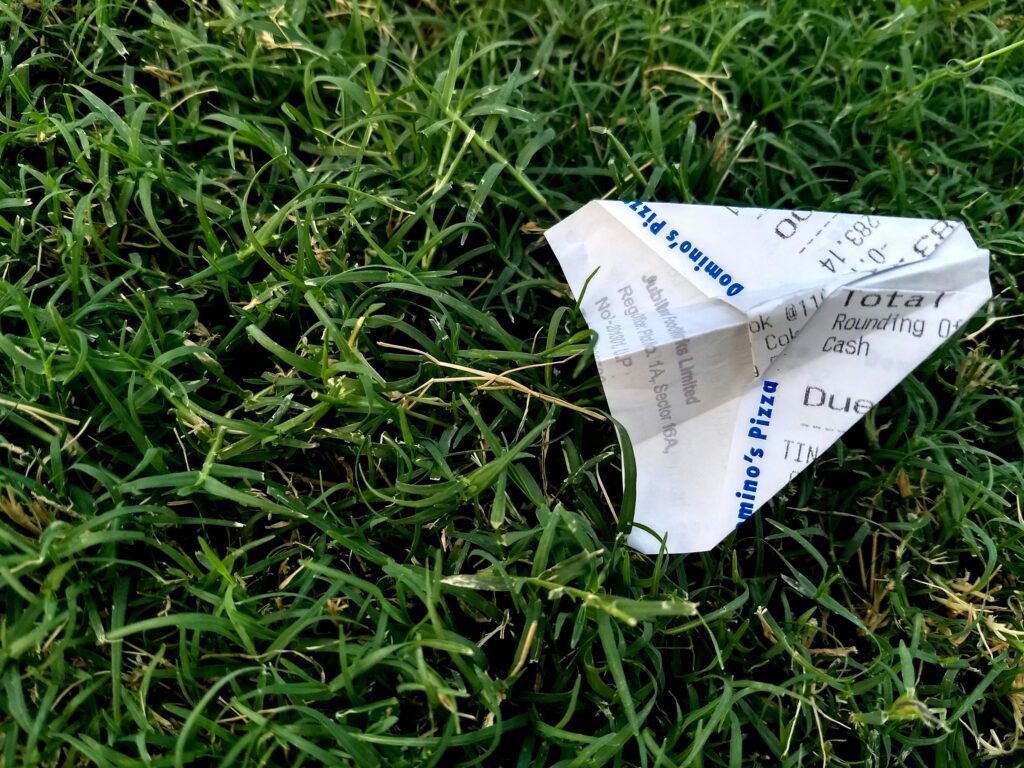Guest blogger Alexandra Olsen is the other half of mortgage broker Lindsay Olsen: mum, self-confessed Type A, and freelance Punchy copy editor.
It’s December: a heady mix of sweetened condensed milk, cocktails, chlorine and carols. Your calendar is bursting with events and you’re juggling more covert to-do lists than St. Nick himself. You’ve switched from your regular anxiety to your special brand of Christmas anxiety (whilst still genuinely frothing on festive spirit). Fast forward past the big day, when the last scrap of Chrissy ham has been gobbled and the tree is looking worse for wear, in that hazy space between the 25th and 31st… and you begin to crave the new year ahead. For me, it’s the crisp blank pages of a fresh planner calling; the prospect of a whole year to accomplish a whole lot that gets me feeling all goal orientated.

Speaking of goals: in this post we’re tackling the goal of saving money through budgeting.
We’re coming at it from a very REAL LIFE perspective (mine). This isn’t just a ‘How to make a budget’ directive. We’re going to interrogate those pesky little pitfalls that love to show up and make our budgets FAIL. We will NOT let our goals be derailed!
Pre-game pep talk done, here’s a quick intro to me: I’m Alex, wife and right-hand-woman to Lindsay at Tweed Coast Home Loans. As a mum of 3 and Head of Household Spending (among my 37 other titles) I’m here to share my budgeting insights so we can all start the new year on the right track towards achieving some big fat goals.
Are you new to budgeting and want some direction on how to start? Or have you tried budgeting in the past and given up? BEEN THERE. Either way, here’s some typical reasons why your budget might fail:
- Not setting specific goals. Wishy-washy goals = wishy-washy sticking to a budget
- Your budget was too restrictive = your budget backfired
- You realised that tracking your budget can be an absolute chore.
Lindsay and I have experienced all of the above, which qualifies me to dish some dirt and offer some tips that could make your budget actually stick – for the long haul.
Let’s get into those budgeting pitfalls.
OH NO #1: You didn’t set specific goals

Setting specific goals is the KEY to successful saving
If you’re going to live on a budget in order to build savings, there’s one thing you MUST do first: get clear on your goals.
If your goal isn’t specific, you risk losing the incentive to stay focussed. Let’s say you’re saving for a house: rather than just saying, ‘Let’s try cut back and save some money’, you need to do the sums and work out exactly how much money you need to save.
Setting clear savings goals means knowing exactly how much money you’ll need to regularly set aside to reach your goal. These targets will help you stick to your budget; knowing the effort you put in will bring you closer towards your goal.
Here’s a fluffy but fantastic quote: ‘A dream written down with a date becomes a goal. A goal broken down into steps becomes a plan. A plan backed by action makes your dreams come true.’ — Greg S. Reid
Greg was onto something. You’ll want to make sure your goals are written down somewhere where you can easily see them; I’m talking, displayed somewhere in your face, not in an app, and not in a notebook chucked to the back of your walk-in. If you’re working towards a long-term goal, seeing your progress visually can help you stay on track.
OH NO #2 Your finances were disorganised and not budget-friendly
Before you start budgeting successfully, you might need to clean house with the way you organise your money. You might consider separating your money into seperate accounts to facilitate budgeting.
For example, you might have an account from which you pay all of your regular essential expenses and direct debits such as rent, bills, and childcare.
You might also set a weekly budget for your groceries and have a debit card just for that purpose. This method can help you to stick within your weekly grocery budget. If you have a partner, both of you should have a debit card for this same account).
Then finally, you might have a debit card for your discretionary spending money (meaning, non-fixed expenses where you have a choice about what to buy and how much to spend) . If you have a partner, you should each have your own card and separate money (more on this below). This ‘allowance’ would be automatically transferred from your main account on a weekly, fortnightly or monthly basis.
You might want to have another account where you send the money you’ve committed to save periodically. A high interest rate savings account is ideal, so you can make that money work while you’re sleeping).
OH NO #4: You and your partner weren’t on the same page when it comes to your spending money
Partners need to be on the same page when it comes to finances.
One challenge that couples face is figuring out how much money each person can use for discretionary spending.
How much discretionary spending money should each partner get?
In my opinion, each person should have their own account to use for discretionary spending. I think it’s important for each person to have some autonomy with their spending, without having their partner looking over their shoulder. We all need a sneaky McNugget in our lives every now and then without having to run the receipt past our significant other.
Having separate discretionary accounts also means that, as individuals, you can plan what you want/need to do with your money. By managing your own individual mini budget, you don’t have to worry that your partner is going to swoop in and spend a big chunk of your discretionary funds on something they need or want to buy. (Lindsay and I once had a joint discretionary budget, and it backfired for this reason).
Here’s the crucial part: partners probably won’t have the same amount of money on their discretionary spending card. Yes, you read that correctly. I’ll use Lindsay and I as an example. In our household, I’m responsible for most of the discretionary purchases for our 3 children as well as for myself, and for our ad-hoc home expenses. Lindsay’s discretionary needs are considerably less than mine (as well as not being our children’s personal shopper, he also doesn’t have much of a beauty budget, which I’m fine with). For that reason, our discretionary funds are set up for our individual needs. It wouldn’t make sense for us both to have the same amount for our discretionary expenses.
If you’re on a pretty serious savings budget, you have to put in some work at the start to decide what your discretionary budgets should be (because obviously, whatever is leftover will help your savings grow). The process of figuring out your discretionary budget is time consuming but very useful.
How to come up with your discretionary spending budget
To begin, each partner needs to list out every type of discretionary expense that might pop up throughout the year. Start with the broad categories, and then get specific. You then need to estimate how much money you’ll need to cover each category over the course of a year. We do this for a year rather than a month because, for many expenses, it’s easier to look at the year ahead. For example, it would be hard to know how much money you might need for a child’s clothing in a month, but much easier to estimate what they might need across a year. The same principal applies for many expenses. And the more detailed you can be, the more accurate your budget will be.
When you come up with your yearly expenses, you’ll then divide the amount to get your discretionary budget. You might decide to have a weekly, fortnightly or monthly budget. Each person’s discretionary budget will be automatically transferred to them every month, fortnight, or week.
When you’re working on discretionary spending budgets with your partner, disagreements may arise about what you each want to spend your money on. You might also find that you need to trim down your non-essential spending so you can save more money to reach your goals. Tricky discussions and compromises might be needed, but it’s worth it for the satisfaction of you both knowing you’re on the same page and working towards your goals.
OH NO #5: Your budget was too restrictive and you blew it

Making your budget super tight to save money can backfire. In my opinion, it can work better in the long run if your budget is sensible, not strict.
The scenario: you and your partner agree you need to spend less and save more so you can reach your savings goal faster. You agree to each have access to $100 per week for discretionary expenses. You plucked that number out of thin air rather than putting in the work to figure out a realistic amount.
In reality, for your circumstance, you actually need around $200 per week to cover your needs and a few wants. The budget you allocated was insufficient, so your budget doesn’t work.
What happens if you don’t give yourself enough money to cover your discretionary needs? You might be tempted to tap into your savings account, or come to rely on a credit card that you’re not supposed to be using for discretionary spending.
Once you start spending outside of your discretionary budget, it’s a slippery slope because you lose track of what you’re spending. It becomes a spending free-for-all and it’s very easy to overspend.
My advice to combat this is:
Put the work into figuring out what you need money for
Again, don’t pluck a number out of thin air for your discretionary allowance; your budget should be based on your actual circumstances and spending needs.
Don’t forget your fun coupons
It’s noble to start a budget and say, ‘We won’t order takeaway food for 3 years’. But is that realistic?! It’s about as realistic as me avoiding Kmart. Saving for big things (like house deposits) can take years, so whilst it’s a great idea to cut back on spending – you do need to allocate money for yourself and for recreation.
Adjust your budget if it’s not the right amount
A few years and a couple of children ago our household budget was around $200 per week. This figure is actually laughable for us in 2023. I spent that amount last night on a watermelon, paper towel and a bag of rice. If your budget isn’t enough for what you need, and some of what you want, adjust it, because here’s the thing…
Adding a little padding to your budget can be a good thing
Living on a shoestring budget can work well to achieve short-term savings goals, however, if you’re giing to be saving for a few years, a more sustainable budget might work better.
If you can’t afford to pay for everything you need, and some of what you want, you could end up quitting your budget, or using a credit card, or spending your grocery allocation at The Iconic. Sometimes a bit of extra padding can help you stay on track for the long haul, because your budget is achievable. It makes you feel good when you haven’t overspent, and you still have some money leftover. This keeps up your motivation to continue with your good spending and saving habits.
The trick is to strike a balance between being able to put away savings, whilst cutting back your non-essential spending, but still allowing yourself enough funds to feel like you’re not living on rations.
Experiment with the frequency of your cash injection
Some people will do well with a weekly discretionary budget; others will prefer a fortnightly or monthly cash injection onto their debit card. You might have to experiment to find out what works best for you.
I once tried a monthly discretionary budget, mainly because with children, I thought it would help to have a lump sum of cash to be able to shop for their (many and varied) needs in one hit. However, I remember frequently having only $3 to spread across the last two weeks of the month. It was too easy to spend the budget all at once, sometimes on things we didn’t need.
If you opt for a monthly discretionery budget you need to be able to manage your spending in the short term to ‘save’ for whatever items you need to buy later in the month. This can be a challenge.
A weekly or fortnightly cash injection might work better for some – as it did for me. Having smaller cash instalments can help with impulse spending; you have time to think about whether you really need to buy all the things. A weekly cash injection means that you’ll always know there will be some cash each week, so you’re less likely to fall short for the things you need (if you’re making smart spending decisions).
Hold parts of your budget for ‘big-spending’ months
When you’re on a budget you can run into trouble at certain times of the year. Christmas is the obvious one, but in our family, 4 out of our 5 birthdays fall within 2 months, so you can imagine how that hits the budget.
It can work well to ‘hold’ parts of your budget in your savings account until you need it. Then you can ‘release’ this money onto your discretionary card when needed. It’s the same thing for other big-ticket expenses that you know are going to pop up in your year. For example, you might ‘hold’ some of your discretionary budget to set up a ‘big kid’ bedroom for a toddler (which can cost up to $1K including furniture and linen in case you’re wondering – I know, I recorded the receipts!), or if you need to buy school uniforms ($400 a pop, thanks for asking), or if you’re hosting a milestone birthday.
Ditch the fallback spending methods
When your discretionary budget falls short it can be way too tempting to dip into other money buckets. You might be tempted to use some of your grocery budget, or your strictly-for-petrol-and-medical credit card (it was Black Friday and HELLO I’m saving money in the long run so it’s fine…).
Sigh. If this kind of temptation is blowing your budget, you need to remove the temptation. The first thing to do in my opinion would be to ditch any credit cards (or at least ditch them from your wallet). Yes, credit cards can earn points and work in your favour in certain ways, and yes, it can be comforting to have the safety net of a credit card in emergencies or ‘emergencies’ (flash sales and such).
But at the end of the day, if a credit card is giving you a ‘false sense of money’ or causing you to not budget properly because you know how easy it will be to tap a credit card, it’s a false economy to keep that card. In the very least, stop carrying those cards and see if that eases the temptation.
OH NO #6: You thought you found the best budgeting app ever (but you were wrong)
Does an amazing budgeting app exist? There are some good ones, and maybe you’ll find one that works for you, but I never found one. To me, many budgeting apps didn’t do what we needed them to do based on our life and circumstances. They didn’t suit our unique needs for managing our finances. An app that did only 70% of what we needed it to do wasn’t good for my OCD.
Furthermore, budgeting apps can seem exciting at first, but just like Snapchat, they’re easy to forget. Before you know it, your budgeting app has been swiped to the fourth screen of your phone.
Lindsay and I found that making our own finance and budgeting spreadsheet worked better than the apps we’d tried. We liked being able to set up our spreadsheet exactly as we wanted it to function. It has our goals, our essential and discretionary budgets in detail, tracking sheets, and more. For us, budgeting on-the-fly with an app wasn’t possible, so moving back to an old-school sheet made sense.
The point? Trial and error – find a method that works for you personally.
OH NO #7: You realised that tracking expenses is an absolute punish

The point of manually recording your expenses is to track how much you’re spending in each category of expenses. This helps you stick to your allocated budget.
Much like recording your caloric intake is empowering at first and then becomes most dull, so too is tracking your expenses.
Lindsay and I once went for a record 9 months of recording every single expense. Eventually we both got bored of that and we both stopped doing it.
Me: ‘Oh I should probably tell you I stopped recording my expenses about 2 months ago’.
Lindsay: ‘Same, I haven’t done that for ages, haha.’
Me: ‘HAHA’.
*Moved on with our lives*. Clearly, we needed to re-group on what was working and not working to keep moving forward towards our goals.
Is it necessary to record all of your expenses when you’re on a budget?
Some gurus will say that if you don’t track your expenses, your budget will fail. In the not-so-distant past, I too believed that tracking expenses was the essential part of sticking to a budget. But that was before we had 3 kids, 80 million receipts and no spare time. Now I know better.
Based on my experience, I don’t think you need to track all your expenses for your budget to work. I think it can be extremely helpful – maybe something to try – but I don’t think it’s necessary. The drudgery of recording all your expenses can lead you to stop trying at all. There has to be a better option.
What are the benefits of tracking your expenses… for a while, at least?
Bear with me for a second, because it would be irresponsible of me to not emphasise that tracking your expenses has huge benefits. This is true even if it’s just a temporary thing.
If you don’t tend to shop much, then processing your receipts and recording all your expenses might be easy. But if you’re like me, recording all your expenses is an extra task that you’ll never feel like doing at the end of the day (crazy, I know).
Yet, the truth is, tracking your expenses is the only way you can make sure that you’re spending within your yearly budget and that you’re not overspending in certain categories. If you don’t track your budget, you’re flying blind to a degree. You might end up overspending on some things and not leaving enough money for other things you need.
So, what’s the damn answer?!
How can you budget without tracking your expenses?
If you’re brand new to budgeting, I would recommend tracking your expenses for as long as you can stay committed (it’s a nice novelty to begin with). Firstly, it will give you an idea of whether you’ve under- or over-budgeted for certain things. It’ll also tell you whether you’ve forgotten to budget for some things entirely (inevitable).
Secondly, being in the habit of recording all of your expenses makes you more aware of what you’re spending. It can help to curb mindless spending. You’ll find yourself asking, ‘Do I really need this thing?’
However, at the end of the day, if you don’t want to record all your expenses, it doesn’t mean you can’t stick to a budget. It just means you need to keep an eye on your weekly or monthly allocated funds and pre-plan your upcoming spending as much as possible. You’ll probably need to be more disciplined about culling, or at least delaying, unnecessary spending. And, as mentioned above, it can help to set some of your budget aside for more expensive times of the year.
Smart spending for savvy savers
There’s no getting around the fact that budgeting often means making sacrifices – but you can be crafty about how you spend your money so your life doesn’t feel lacking.
Next month we’ll be dropping a BONUS blog with my favourite hacks for savvy spending. To find out when the blog drops, make sure you’re following @tweedcoasthomeloans on Instagram.
Final thoughts
Budgeting can seem very BORING indeed when it means you can’t buy all the things you want to buy, or do all the things you want to do.
No one wants to live on a budget, but for many, these are the times we’re living in. It’s even more the case if you’re saving hard to buy your own home.
Many people get stuck on the mechanics of how to organise finances and allocate their budget; beyond that, they get stuck when budget boredom sets in. But as I’ve shown, you don’t have to be a straight-A budgeting student to succeed. This is your permission slip to cut some technical corners, if it means you’ll keep heading in the right direction overall. It can help to:
- Keep your budget end goal and your progress VISIBLE
- Remove the temptation of credit cards or similar so you can’t overspend
- Find a method of tracking (or not tracking) your finances that works for you
- Budget enough money to cover your needs and a bit of fun
- Set funds aside for the more expensive months of the year.
When you and your budget are in flow, the feeling of knowing you’re moving closer towards your goals makes the effort and sacrifice worth it.
Hopefully you’re feeling inspired to schedule some planning time before the new year (…maybe after Boxing Day) so you can start your new year fresh – and smash some goals!
Don’t forget to follow us on Instagram @tweedcoasthomeloans for more great info!
Alex.